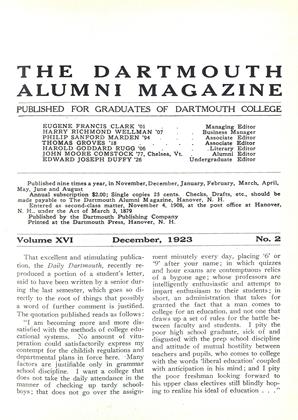The Second Generation. Anthony M. Rud '14. Doubleday, Page & Co., Garden City, N.Y.
The "day of the immigrant" is almost a thing of the past in American life. The immigrant of the Nineteenth Century has already had his sons and grandsons, and the "new" Americanism is upon us. But the curious part of it is that the "new" Americanism, feared in certain sections in America' for many years, is strangely like the "old" Americanism. It seems to be a broader Americanism, but the idealism is everywhere the same. There was an Englishman who said "It's nothing to be an American; anybody can become an American." Perhaps, in a way, he spoke rightly, - the only trouble with his remark was that he didn't go deep enough into the perplexing, much-discussed, much-misunderstood thing that we call "Americanism."
Anthony M. Rud approaches the question from another point of view in his book The Second Generation. He takes a first generation immigrant from Norway and introduces that immigrant into American life. The immigrant was narrow-minded and grubbing when he came to America; he was much more narrow-minded and much more grubbing after he had been here many years. But his son,—well, that's another story. The son came to America filled with an idealism that came from a remarkable mother. That idealism was fostered by a certain Dr. Rand in the story, whom I believe to be some friend of the Rud family, perhaps the Dr. Anthony Rud, to whom the book is dedicated, - and a very typical American he is, of the type that we like to think of as American. The boy grows up into a world of greater idealism which even the almost sordid realism of the earlier part of the story cannot dim,—perhaps the early realism but contrasts the later idealism.
Einar, the father strides along mercilessly in his pursuit of material fortune. Lief the son goes hesitatingly solving the right and wrong of things as he progresses. But he grows into the medical profession, strengthens himself and proves his right to live by the hardest kind of work and the constant establishment of the highest type of standards. Both men are very human, real, and individual.
There's a prophecy in the very appearance of the book that the literature of the next decade in American life is going to be a Second Generation literature. There have been symptoms of such a possibility and it is at any rate pleasant to think that while we are just now in a very whirlpool of literary indecision and instability there is coming a literature that will run closer to type than Babbit or Polyanna and will yet' satisfy the cravings of the romanticists and the realists alike. Rud's book is undoubtedly a tribute to his own father, but it is a magnificent tribute to American idealism and a promise of a great American literature that is yet to come.
 View Full Issue
View Full Issue
More From This Issue
-
 Sports
SportsFOOTBALL
December 1923 -
 Article
ArticleThat excellent and stimulating publication, the Daily Dartmouth,
December 1923 -
 Class Notes
Class NotesCLASS OF 1903
December 1923 By Perley E. Whelden -
 Class Notes
Class NotesCLASS OF 1903
December 1923 By Perley E. Whelden -
 Article
ArticleALUMNI COUNCIL MEETS IN BOSTON
December 1923 -
 Class Notes
Class NotesCLASS OF 1911
December 1923 By Nathaniel G. Burleigh
Books
-
 Books
BooksAlumni Articles
FEBRUARY 1967 -
 Books
BooksOLD GLAMORS OF OLD AUSTRIA
DECEMBER 1930 By Arnold K. Borden -
 Books
BooksTHE BRITISH ATTACK ON UNEMPLOYMENT
March 1935 By H. F. R. Shaw -
 Books
BooksCRIMSON PHILIPPINE JUNGLE
January 1944 By Herbert F. West '22 -
 Books
BooksLaw of the Jungle
NOV. 1977 By JOHN S. RUSSELL JR. '38 -
 Books
BooksTHE DISENCHANTED,
December 1950 By JOSEPH A. MILLIMET '36


